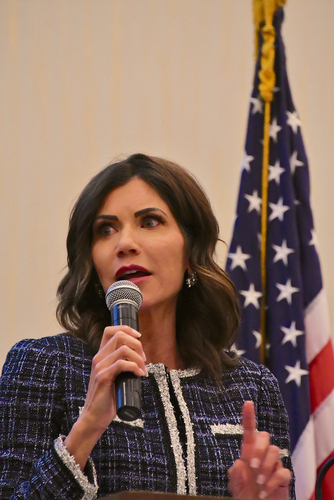Listen To Story Above
The Associated Press and the Trump White House are engaged in a heated dispute over press access, stemming from disagreements about geographical naming conventions and broader concerns about language usage in media.
The conflict intensified when White House deputy chief of staff Taylor Budowich expressed concerns to Axios about what he perceives as the AP’s partisan approach. “This isn’t just about the Gulf of America,” Budowich stated. “This is about AP weaponizing language through their stylebook to push a partisan worldview in contrast with the traditional and deeply held beliefs of many Americans and many people around the world.”
The tension escalated after the AP declined to adopt Trump’s presidential decree renaming the Gulf of America. In response, the Trump administration excluded AP reporters from Oval Office executive order signings, where the president typically provides extensive impromptu comments to the media.
🚨 #BREAKING: The Trump administration has officially BANNED the AP from the Oval Office and Air Force One after they refuse to stop peddling fake news about the Gulf of America
GOOD! Now ban Kaitlyn Collins and CNN
Karoline Leavitt was crystal clear this week reiterating her… pic.twitter.com/Cy0MvzItux
— Nick Sortor (@nicksortor) February 14, 2025
While the AP protested this exclusion, White House press secretary Karoline Leavitt clarified that these signing events occur in spaces with limited capacity. She emphasized during a recent press briefing that while the AP maintains access to regular briefings and credentialed areas, participation in all events isn’t guaranteed for every outlet.
The situation further developed when the White House announced it would redistribute AP’s previous allocations for Oval Office and Air Force One coverage to other media organizations, citing the outlet’s continued refusal to acknowledge the Gulf’s name change.
AP’s vice president of Corporate Communications, Lauren Easton, defended her organization’s stance, telling Axios: “AP is a global, fact-based, nonpartisan news organization with thousands of customers around the world who span the political spectrum. … If AP journalism wasn’t factual and nonpartisan, this wouldn’t be the case.”
Hey AP, did you have any issues in following what the previous administration was doing when they were renaming things?
I didn’t think so.
It’s Gulf of America, I repeat… Gulf of America! pic.twitter.com/Fd7n2G01tc
— Julio Murillo (@JEM_el_tarasco) February 14, 2025
The Trump administration maintains that the AP’s position constitutes disinformation. “It is a fact that the body of water off the coast of Louisiana is called the Gulf of America, and I’m not sure why news outlets don’t want to call it that,” Leavitt remarked.
Easton responded to these criticisms by explaining that AP’s guidance is optional for its members and customers. “Again, this is guidance. It’s not surprising that political parties, organizations or even individuals may disagree with some entries. The stylebook doesn’t align with any particular agenda.”
The dispute highlights broader disagreements over AP’s style choices, including their approach to terms related to gender-affirming care, racial designations, and immigration terminology, reflecting deeper divisions in how language is used in contemporary media coverage.






